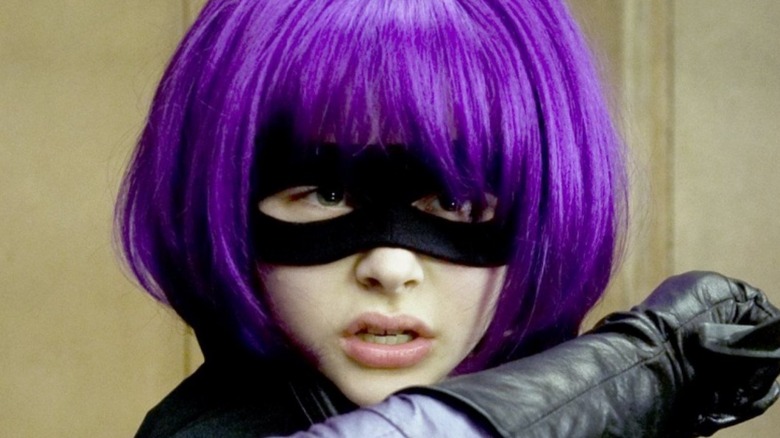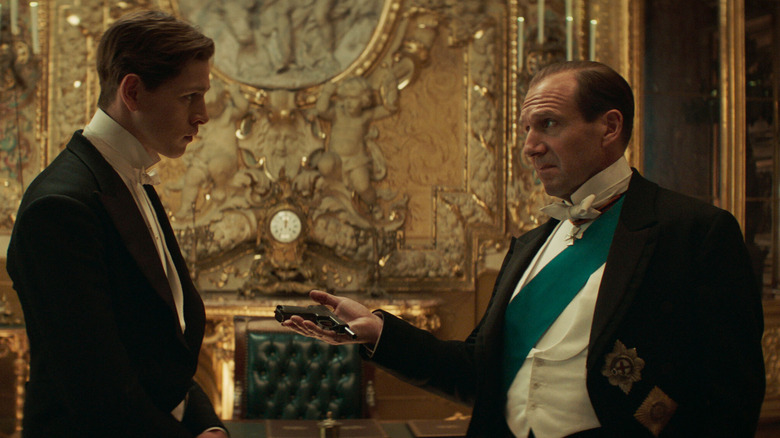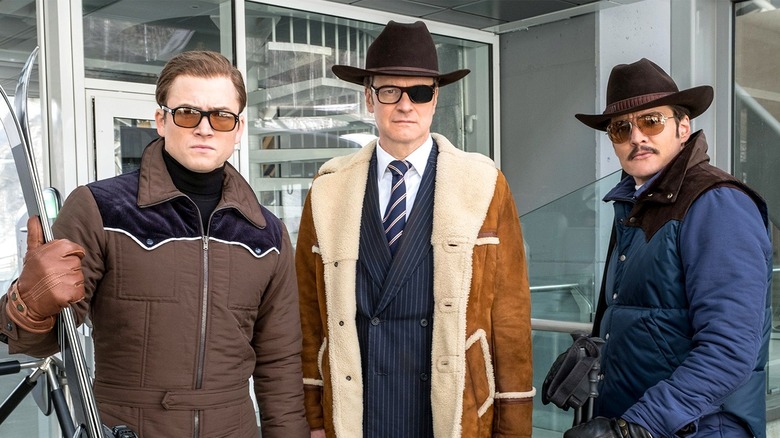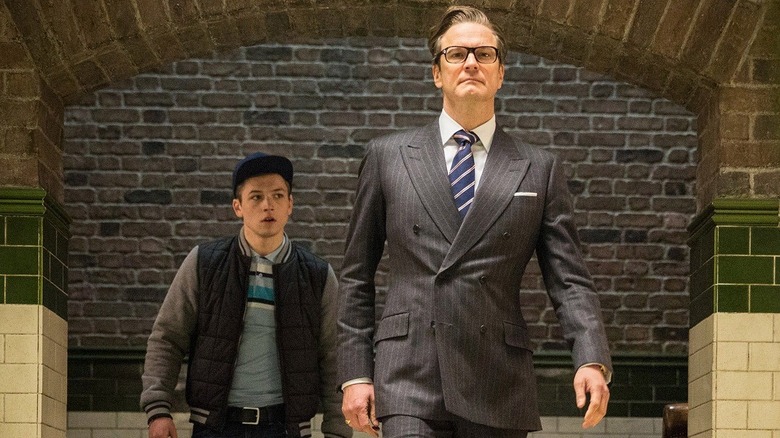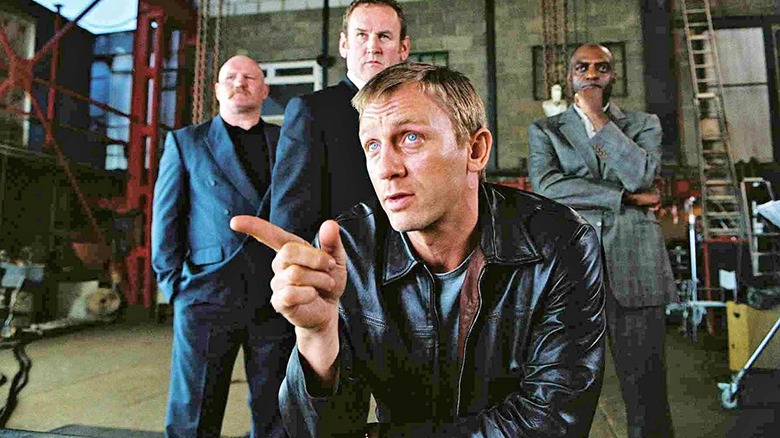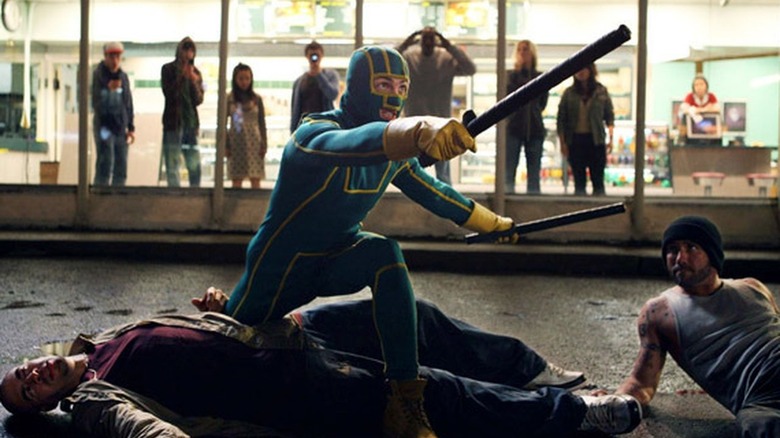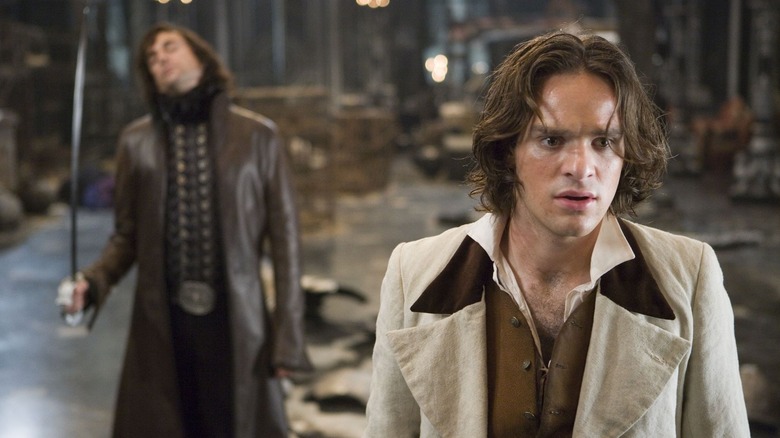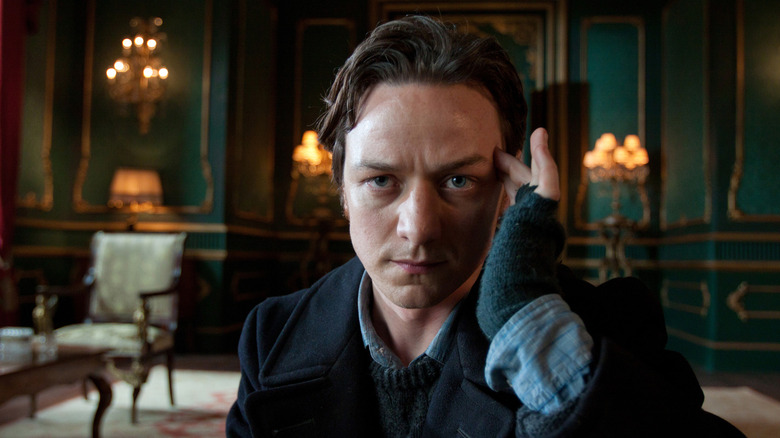All Of Matthew Vaughn's Films Ranked Worst To Best
Although his directorial credits are somewhat limited, British filmmaker Matthew Vaughn has forged an innovative style that fuses sharp humor with memorable characters, shocking darkness, and genuine sincerity. While he frequently works with established franchises and adapts previously existing properties, Vaughn makes his stories feel original, and his confidence behind the camera has made him one of the most prominent voices of his generation.
Vaughn is brilliant in the way he approaches familiar genres. Espionage thrillers, romantic fairy tales, superhero origin stories, and underground mafia sagas are by no means new, but Vaughn knows his cinematic history and subverts expectations by tackling these stories from a less familiar perspective. A more traditional approach may have made these films feel stale and unoriginal, but with Vaughn at the helm, they come across as fresh and help breathe new life into their respective genres.
Whether he's working with classic Marvel characters or exploring the British criminal underworld, it's always interesting to see what Vaughn has in store. Here are all of his films, ranked worst to best.
7. The King's Man
While Matthew Vaughn has clearly connected with the "Kingsman" franchise, having directed, produced, and co-written three installments in the series, he maybe needs to step away, at least for a little while. This is underscored by 2021's "The King's Man," a World War I-set prequel that unveils the origins of the eponymous British intelligence agency, as it takes on the villainous cabal responsible for the war. With its turgid pacing, awkward sense of humor, and stilted character development, the ambitious actioner is not only the worst in the franchise but in Vaughn's entire filmography to date.
There are some things to enjoy in "The King's Man," including its stylized action set pieces and a solid ensemble cast led by Ralph Fiennes as protagonist Orlando Oxford. But Oxford's repeated obstinance in refusing to let his son go to war and character beats that feel more odd and self-indulgent than funny or cool derail the film. A cross between Sam Mendes' "1917" and the established "Kingsman" franchise, Vaughn brings the ambition, but not the sense of joy that made its two predecessors in the series so popular in the first place. Throw in plot twists the audience can see coming a mile away and a forced post-credits scene, and the whole thing is in shambles.
6. Kingsman: The Golden Circle
Vaughn's "Kingsman" sequel is his weakest film by a wide margin. It's hard to doubt his ambition in crafting a follow up that outdoes the shocking extremes of the first film, but in aiming big, Vaughn lost the charm that made the original film unique. The first "Kingsman" had engaging characters and playful nods towards the history of spy films. However, "The Golden Circle" is so plot heavy that it often feels like Vaughn is trying too hard to cram all of his ideas into a single, convoluted story.
The main issue with "The Golden Circle" is that it doesn't justify the return of Colin Firth's Harry Hart. Hart's death in the first film was a real moment of darkness that showed that, despite the self-aware tone, the films are not spoofs. Not only is his survival in "The Golden Circle" implausible, but it destroys Eggsy's (Taron Egerton) character development. Eggsy had begun to grow and develop as a hero of his own, and no longer needed a mentor character. The time dedicated to explaining Hart's return also hampers the film's momentum.
Julianne Moore is underwhelming as villain Poppy Adams, a cartel overlord who launches a plot to kill all drug users. Moore's performance is too campy, even for the film's exaggerated style. The attempts at social satire, with a conspiracy involving the President of the United States (Bruce Greenwood), also fall flat.
5. Kingsman: The Secret Service
When it debuted, "Kingsman: The Secret Service" was a breath of fresh air. The James Bond and Jason Bourne films had become grittier than ever, making "The Secret Service" a throwback to the classic days of spy cinema with fun gadgets, outrageous locations, and eccentric villains. "The Secret Service" stays modern and has a surprising aptitude for dark humor and outrageous deaths, as evidenced in a frantic sequence in which Colin Firth takes out an entire church of fanatic extremists. The bloodbath should make even the most hardened viewer laugh and cringe in equal manner.
Taron Egerton is an extremely likable protagonist. Eggsy's backstory is compelling, as he's wrestling with living up to the expectations of a father he never knew. Growing up poor and struggling to stay out of trouble, Eggsy fulfills his potential by following in his father's footsteps and joining England's elite squad of gentlemen spies. Firth's character doesn't only teach Eggsy the tenets of the Kingsman's code, but how to be a man of honor as well.
"The Secret Service" does drag during Eggsy's training, and the storyline about Firth investigating the sadistic billionaire Richmond Valentine (Samuel L. Jackson) is more interesting. The references to Roger Moore-era Bond films also grow irritating; it's nice that Vaughn knows his history, but callbacks are unnecessary when the film is creating an identity of its own.
4. Layer Cake
Prior to becoming a director, Vaughn worked as a producer for fellow British filmmaker Guy Ritchie, who codified the London crime thriller with films like "Snatch" and "Lock, Stock and Two Smoking Barrels." With his directorial debut, Vaughn took on a similar story to the ones told by his longtime friend, but "Layer Cake" is far from a Ritchie duplicate. While Ritchie's films are darkly comic and relentlessly paced, Vaughn opts for a slick and tragic tale about a man who is unable to escape the consequences of his criminal lifestyle.
"Layer Cake" is the film that announced Daniel Craig as a major talent, and his role as the ruthless cocaine shipper known as "XXXX" is largely seen as the performance that helped him become James Bond. XXXX knows how dangerous the drug wars are getting, and he looks for an early retirement. After deciding to become a legitimate businessman, XXXX reenters into the game when his longtime ally Jimmy Price (Kenneth Cranham) asks him to oversee one last job. Craig brilliantly shows XXXX's conflicted feelings; he knows how to run a tight operation, but he's hesitant to engage out of fear of being drawn back in.
The various gangs and political players involved in the heists could be confusing, but Vaughn clearly explains each group's involvement in the story, giving them a purpose. Even minor characters, such as Tom Hardy's Clarkie, are memorable.
3. Kick-Ass
"Kick-Ass" came out right when superhero movies were beginning to dominate the film industry. The genre was in desperate need of a shake up, and "Kick-Ass" explored the filthy reality of what being a caped crusader would actually be like. The prospect of saving lives and fighting cruel villains seems fun in the pages of a comic book, but as a daily profession, it would make it impossible to live a normal life. "Kick-Ass" also satirizes the notion of hero worship; the titular crime fighter possesses no powers, has no reason to become a hero, and is far from charismatic.
The story's masterstroke is making the characters comic book fans, and the film references the history of superheroes through conversations that feel realistic. Aaron Taylor-Johnson is effective as the geeky Dave Lizewski, who begins fighting crime because he feels unsatisfied. Taylor-Johnson makes Lizewski initially pathetic, but shows his growth as he learns to accept the responsibility that he once thought he could reject.
However, the real scene stealers are the veteran superhero Big Daddy (Nicolas Cage) and his young daughter, Hit-Girl (Chloe Grace Moretz), who was trained by her father from an early age. Vaughn utilizes Cage's unconventional sense of humor, but Big Daddy also gives important lessons to Lizewski about fighting evil no matter the personal cost. Moretz is a burst of energy, and seeing a child ruthlessly dispatch mobsters is hilariously awesome. Mark Strong is also fun as the main villain, Frank D'Amico.
2. Stardust
It's a real shame that "Stardust" underperformed financially, because the sweeping romantic adventure deserved to be "The Princess Bride" for a new generation. Compared to the sadistic nature of Vaughn's R-rated films, "Stardust" is charmingly sincere. The characters are quirky and the story lampoons familiar fantasy tropes, yet the emotional moments are still heartfelt. It showed a sweet, sensitive side to Vaughn and proved how versatile of a filmmaker he is.
The lovesick peasant Tristan Thorn (Charlie Cox) yearns for the love of the maiden Victoria (Sienna Miller). He embarks upon an epic quest, traveling across the magical fantasy kingdom of Stormhold in order to retrieve a fallen star with a humanoid form named Yvaine (Claire Danes). Not only is Tristan hopelessly naïve and limited in his abilities as a swordsman, but he's never traveled outside of the stone borders of his hometown. Cox brings the hero's journey to life as Tristan grows beyond his comic incompetence.
The heart of "Stardust" is the growing bond between Tristan and Yvaine. The pair bonds as they escape the vengeful Prince Septimus (Mark Strong), who wants a magic stone that Yvaine holds in order to take the throne of Stormhold. Gradually, Tristan realizes that, although he began the mission looking for Victoria's love, it's Yvaine's that he has earned. Strong chews the scenery as an insecure ruler, and Michelle Pfeiffer is having a blast as an ancient witch that Septimus unleashes.
1. X-Men: First Class
Before Vaughn's involvement, the X-Men franchise was in shambles. "X-Men: The Last Stand" ruined the setup of the first two films, and the disastrous "X-Men Origins: Wolverine" failed to tell a compelling origin story. Fans were skeptical that another prequel would work, especially considering how iconic the performances by Patrick Stewart as Professor X and Ian McKellen as Magneto already were. However, Vaughn's brilliant "First Class" told a fascinating story about two friends who bonded over their differences, only to be torn apart by how they chose to confront intolerance.
The young Charles Xavier (James McAvoy) and Erik Lehnsherr (Michael Fassbender) come from opposite backgrounds. Xavier is born into privilege, living in an expensive mansion and granted the resources to research mutant development. Lehnsherr is raised with tragedy, and witnesses the violent slaughter of his family during the film's gripping Holocaust sequence. Xavier seeks to make amends with mankind while Lehnsherr chooses a path of vengeance, and Vaughn understands how privilege impacts both characters' perspectives. The younger versions of Beast (Nicolas Hoult) and Mystique (Jennifer Lawrence) also flesh out characters not given enough depth in the original X-Men trilogy.
The recreation of the '60s is spot on, with fun period details recalling Vaughn's love of early James Bond movies. The incorporation of mutants in the Cuban Missile Crisis is an interesting way of tying the story to real history, and creates an exciting climax in which the mutants are divided by their loyalties to Professor X and Magneto.
